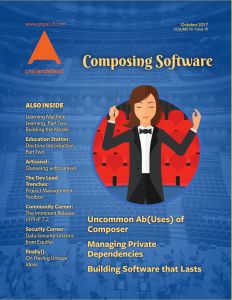Uncommon Ab(Uses) of Composer
Composer is a hugely flexible tool that works reliably on all but the most obscure hosts/platforms. What’s more, it provides a plugin system which allows you to pull external code from a repository and have the code hook into the standard Composer execution flow. The logical conclusion is Composer is used for much more than just pulling in dependencies. During the course of this article, we will examine some of the less mainstream uses of Composer, while discussing the technical details that make these possible. by Alain Schlesser
Managing Private Dependencies
Read this Article (PDF)
Using Composer and a private package server is the most efficient way to manage private dependencies with PHP. I recommend using the software as a service, Private Packagist, or Satis, the open source, self-hosted package server. In this article, I’ll show you how to easily set this up for your own projects. by Andrew Cassell
Building Software that Lasts
A lot has been written about building maintainable, lasting software architecture from a technical point of view—but still, a lot of well-made software disappears while that piece of code you wrote as a quick workaround stays around for a lifetime. It seems there’s more to lasting software than just its architecture. Having spent the past 15 years working on various software projects, I noticed four key parts to a software’s success: the users, ecosystem, technology, and the team developing it. In this article, I want to take a closer look at all four of them and how they influence “software durability.” by Susanne Moog
Learning Machine Learning, Part Two: Building the Model
Part One introduced the machine learning (ML) workflow and accomplished its first step: data preparation. Now in Part Two we build our ML model and evaluate results. We’ll be using the ML libraries in Python, but do all other data processing in PHP. by Edward Barnard
Education Station: Doctrine Introduction, Part Two
Welcome back to the second part of the Doctrine Introduction series. In the last article, we set the stage by learning about what Doctrine is, how to install it, and how to create and work with entities. In this part, I’m going to round out your basic working knowledge of Doctrine. by Matthew Setter
Artisinal: Queueing with Laravel
“Why do today what you can put off until tomorrow?” is the great procrastinator’s quote. Queues are procrastination central for your application. When we talk about procrastination in your application, it is often for better reasons than the term would usually imply. When building web applications, we want to return a response to the request as soon as possible. Not because we’re impatient, but because we want our end user experience to be fast. by Joe Ferguson
Last month I promised we would talk about something other than the social aspect of being a dev lead. I want to dive into some of the different tools I use on a day-to-day basis. Many of the tools are project management related, but some are just nice things to keep me organized overall. by Chris Tankersley
Security Corner: Data Security Lessons from Equifax
In early September, Americans everywhere began to panic when news broke that Equifax, one of the three largest credit bureaus, was hacked. Early signs showed the personal information (name, address, social security number, etc.) of more than 143 million people were stolen in the breach. Equifax made several critical mistakes along the way which are easy to reproduce by accident and could impact your business as negatively as theirs. Instead of merely highlighting what went wrong, let’s walk through a few concepts that could surely have helped Equifax avoid this hack. by Eric Mann
At the end of next month, we’re going to see the newest version of PHP released. Version 7.2 will be dropped on November 30th, ready for the masses. By the time you read this, the third release candidate will be out, so you can already give it a spin. Sara Golemon and Remi Collet are the release managers for the upcoming version, and Sara was kind enough to spare a few moments to let us know her thoughts. by James Titcumb
finally{}: On Having Unique Ideas
There is a well-documented phenomenon in the scientific community known as multiple discovery. It naturally refers to the fact that it is rare for one scientist to make a unique discovery. At approximately the same time in another part of the world, another scientist is obtaining the same breakthrough. It could be written up to coincidence, but it keeps happening over and over. It happened back before the world was so well connected as we are today, and it continues to occur at an accelerated rate in today’s society. by Eli White






